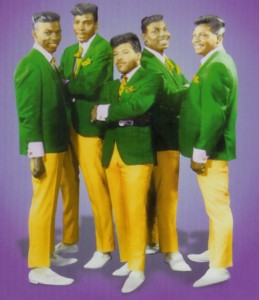They’re from New Jersey. Me too, at least originally. In fact, the town the Parliaments called home is just a few minutes away from where I lived right before I moved to Rhode Island three years ago. It’s always fun to go back home, so this week we’re heading for Plainfield, NJ to learn about a group that started out as one thing and turned into something else completely.
George Clinton was part-owner of a barbershop in Plainfield. The back room of the barber shop was the place that the Parliaments first got together in the late ’50s, and named themselves after a popular brand of cigarettes. The group’s lineup shifted a little in the beginning, but finally gelled with Clinton, Ray Davis, Fuzzy Haskins, Calvin Simon, and Grady Thomas.
The Parliaments were supposed to be Clinton’s take on Frankie Lymon & the Teenagers, but as you might expect from something that Clinton was involved in, they developed their own funky style. Still, hits weren’t easy to come by. The group had a tough time through most of the ’60s, recording singles that went nowhere for a variety of small labels. Early efforts included “Poor Willie” on Apt Records, “Lonely Island” on Flip Records, and “Heart Trouble” on Golden World Records.
Things changed for the better when Clinton got a job as a songwriter and producer for Motown Records. He began to commute to Detroit on a weekly basis to produce artists like the Pets, and Roy Handy. The big break for the Parliaments came in 1967 when they released “(I Wanna) Testify” on Revilot Records.
“(I Wanna) Testify” was a big hit for the Parliaments, reaching #3 on the R&B chart and having crossover success at #20 on the Pop chart. The thing is, Clinton was the only Parliament on it. The recording was done in Detroit, and Clinton was the only one who could get out there at the time. Because the record featured Detroit musicians and background singers it is now considered an example of Detroit soul, despite the group’s NJ origin.
The success of the single meant that it was time to go on the road. The Parliaments were expanded to include five singers and five backup singers. Can you see something taking shape here? Just as things were taking off for the Parliaments, there was trouble with their label, Revilot. The legal proceedings enjoined Clinton from using the name Parliaments. Clinton wanted to keep recording for other labels, so he renamed the group, that’s right, Funkadelic. The idea was to feature the five musicians as a funk-rock band with the five singers as backing vocalists, albeit uncredited ones.
When Revilot finally declared bankruptcy, the Parliaments contract was sold to Atlantic Records. Clinton didn’t want to work with Atlantic however and gave up on doo-wop entirely so that he didn’t have to. Once Funkadelic was set as a recording and touring entity, Clinton relaunched the Parliaments as Parliament in 1970. Despite the fact that it was the same five singers, and the same five musicians, the bands were signed to different labels, and the marketing suggested that they played different styles of funk.
Get it? Me neither. It was all so much fun that nobody cared who was in what band or what label they recorded for. The Parliament-Funkadelic show became a juggernaut in the ’70s, and when Parliament’s Mothership Connection was established in 1975 it was the greatest show on earth. Funkadelic expanded the empire to encompass the entire universe with One Nation Under a Groove in 1978.
The 1974 Parliament album Up For the Down Stroke featured a very different version of the Parliaments hit, with the titled shortened to simply “Testify.”
And to think, it all began in the back room of a barbershop in Plainfield, NJ.






Comments